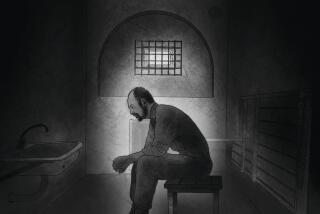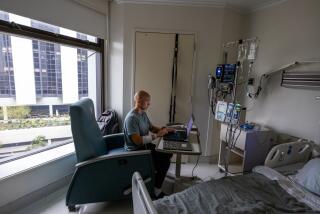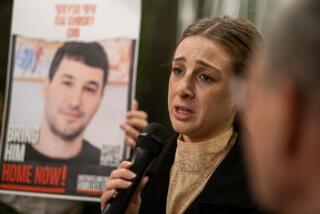Senate Opens Drive to Help 6 Soviet Cancer Patients Emigrate
- Share via
WASHINGTON — A tearful telephone call Thursday from Soviet cancer patients to families they are seeking to join in the United States opened a bipartisan Senate campaign aimed at getting half a dozen terminally ill patients out of the Soviet Union for medical treatment.
“We are not talking politics; what we’re talking about is health and family,” said Sen. Pete Wilson (R-Calif.). He and seven other senators wrote to Soviet leader Mikhail S. Gorbachev and asked him to allow the cancer victims to leave the country to be with their families.
The six so-called refuseniks--people who have applied for emigration from the Soviet Union but have been denied exit visas--include a 7-year-old boy suffering from leukemia.
All six seek alternative, sometimes experimental, cancer treatment and wish to be reunited with families in California, Colorado, Massachusetts, New York, Canada and Israel.
“For them, family reunion is truly a matter of life and death,” said Dr. Gerald Batist, founder of the International Cancer Patients Solidarity Committee. He helped coordinate Thursday’s telephone call, which was placed during a Capitol Hill news conference attended by the eight senators.
Batist and other physicians, including Dr. Steven Rosenberg, chief of surgery at the National Institutes of Health, agreed that emotional support is the key to recovery--or at least peaceful death--for cancer victims.
“The best support is provided by their families,” Rosenberg said.
Tatyana Bogomolny, who has breast cancer, has been trying for six years to join her father and sister in San Francisco. Her husband has been trying to leave the Soviet Union since 1966.
“We’re very happy and very grateful that you have found time to be with us and that you are trying to do something,” said Bogomolny, 47, in Thursday’s phone call. “We are missing (our relatives) very much, and the best cure for us will be to be reunited with our families.”
Bogomolny’s father, Ilya Heifets, wiped tears from his eyes when he heard his daughter’s voice on the telephone but responded firmly in Russian, with his daughter, Natasha Sverbilova, 39, interpreting.
“My father wants to stress that both of them (the Bogomolnys)--all their relatives are in the West,” Sverbilova said. “He says, ‘Can you imagine how difficult and stressful it is to be here when my daughter is there?’ ”
Bogomolny asked that American doctors “make a special appeal to Russian doctors and the Soviet officials on behalf of these people who have no time to wait any more.”
More to Read
Sign up for Essential California
The most important California stories and recommendations in your inbox every morning.
You may occasionally receive promotional content from the Los Angeles Times.













